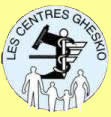GHESKIO Wins 2010 Gates Award for Global Health
 Groupe Haïtien d’Étude du Sarcome de Kaposi et des Infectieuses Opportunistes (GHESKIO) was selected as the 2010 winner of the prestigious Gates Award for Global Health. The honor is well-deserved given GHESKIO’s innovative clinical service, research, and training programs and rapid response in treating those injured during the earthquake. GHESKIO's leadership is needed more than ever as the Haitian health care system is reconstructed. The press release is below, a fact sheet and an interview with GHESKIO Director Bill Pape are attached, and finally click here to see the award ceremony.
Groupe Haïtien d’Étude du Sarcome de Kaposi et des Infectieuses Opportunistes (GHESKIO) was selected as the 2010 winner of the prestigious Gates Award for Global Health. The honor is well-deserved given GHESKIO’s innovative clinical service, research, and training programs and rapid response in treating those injured during the earthquake. GHESKIO's leadership is needed more than ever as the Haitian health care system is reconstructed. The press release is below, a fact sheet and an interview with GHESKIO Director Bill Pape are attached, and finally click here to see the award ceremony.











